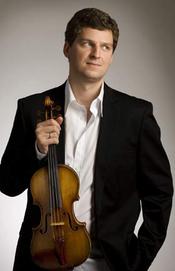
Many classical musicians have built successful careers by narrowly focusing in one area: maybe baroque music, or contemporary works. But not violinist James Ehnes – his wide-ranging repertoire includes not only Bach, Beethoven and Brahms, but also Barber, Bartók, Berg, Berlioz, Bernstein, Britten and Bruch. That’s just the Bs.
Originally from Brandon, Manitoba (a rural town on the Canadian prairies), the 35-year-old musician currently lives near Sarasota, Fla. He gave this interview shortly after his arrival in Houston for the weekend’s concerts.
Q: There’s a rumor that you located in the Sarasota area to be near the Boston Red Sox training camp. Is there any truth to this?
A: Boston finally won a game – I was very pleased! And yes, that was one of the reasons why I went to Florida, in 2001. I try to make it to one or two spring-training games a year. But the bigger reason was that it was where my wife was working at the time.
Q: You’re also a frequent visitor to Houston.
A: This is my sixth time with the Houston Symphony, so I feel like I’ve established a good relationship with the orchestra. They’re a pretty nice group of people. I always have a really good time in Houston, and I have some good friends in the orchestra. That makes a big difference.
Q: Your new disc of Bartók concertos with England’s BBC Philharmonic Orchestra will be released shortly in the U.S. What inspired you to record this repertoire?
A: It was an ideal opportunity. I’ve worked a lot with the BBC Philharmonic over the years, and the conductor, Gianandrea Noseda, is one of my closest musical friends. For pieces as intricate as the Bartók concertos, you want to work with people you know well.
Q: You’ve done a lot of recording, and you’ve even won a Grammy award. But you’ve also said that you’re not entirely comfortable with the idea of recording. Why is that?
A: When you’re making a recording, you’re not just trying to give an effective performance, you’re creating a document that people can go back to time after time – and will hopefully still enjoy. There’s an enormous amount of responsibility involved in that.
Also, if you listen to a recording by someone, it’s tempting to say, “OK, that’s what he thought of that particular concerto.” People don’t realize that it’s really just the way he played it that day, for a multitude of reasons. Maybe he was in a good mood or a bad mood. Maybe he was getting along well with the conductor, or maybe they were fighting. Who knows?
But for all the stress involved in making recordings, I really like having them. They make me feel like I’ve created something solid, that I can put my hands on.
Q: You’re now the director of the Seattle Chamber Music Society. What made you want to take that job on?
A: I’ve been playing at that festival for about 17 years. The next festival, in February, will be my first, although I’ve been an associate director there for the past couple of years. So I feel close to the organization, and to its audiences.
When I heard that the director was going to retire, I thought, “Who can take this over, and keep it the way we like it?” I realized that if I wanted the job done in a particular way, I was going to have to do it myself. And it’s a great opportunity for me to indulge some of my ideas. I’ve always enjoyed putting together concert programs, if only in my head. This is my chance to really do it.
Q: In Houston, you’ll be playing Brahms’ Violin Concerto. How would you describe your approach to this work?
A: I find questions like that hard to answer, because it’s always easier to describe someone else’s approach than it is to talk about your own! It’s not like I’ve made a conscious decision about how I’m going to play it. It’s more subconscious: There are lots of ways that the Brahms can be played, but for me it has to go a certain way.
What I can say is that this concerto is a piece with many incredible moments. But it will fall flat if you don’t have a well-conceived over-arching plan. I try to make it a piece that has a lot of continuity, so people don’t get stuck in the moments. But I also want all those moments to get their due.
Q: Do you have any plans to get more involved with conducting?
A: I’ve done some conducting with the Manitoba Chamber Orchestra, and with some orchestras in Australia and New Zealand. And I’ve enjoyed the limited amount I’ve done. But I also enjoy the physical processes of playing an instrument. As a conductor, you’re informing the interpretation – but there’s always a disconnect, because no matter how clearly you show what you want, you’re not actually making the sound. I find conducting interesting – but I haven’t made any decisions in my mind as to how far I want to go with it.
Q: What’s next for James Ehnes?
A: I’ve got some more recording projects, such as a Tchaikovsky CD that will be out later this year. And I have my own string quartet – the Ehnes Quartet – and we play about a dozen concerts a year. I expect it will take us about 150 years to work through all our favorite pieces in the quartet repertoire!
© Colin Eatock 2011
 RSS Feed
RSS Feed

